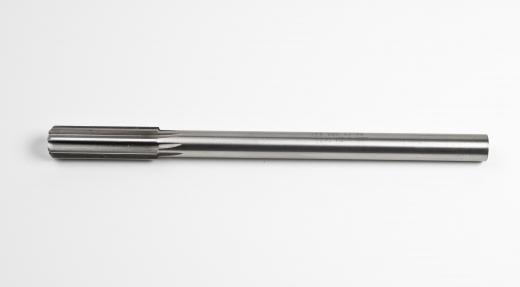A hand reamer is a small hand-held cutting tool used to finish drilled or machined holes to an exact diameter. These tools consist of a metal shaft manufactured from a hardened tool-steel alloy. Along a portion of the length of the shaft, there are several flutes or cutting blades arraigned in a circular pattern in a fixed diameter. The other end of the shaft is machined into a square that fits a tap wrench handle. Hand reamers are commonly used in machine shops to repair and manufacture high-precision machine tools.
Many hand reamers are slightly tapered and beveled near the end of the shaft, as this allows for easier insertion into an existing hole. Some hand reamers are not tapered or beveled, however, and are used when the entire depth of the hole must be reamed to size. Once inserted into the hole, the hand reamer is slowly turned by hand, usually with the aid of a tap wrench handle. The blades on the shaft remove only the small amount of material required to finish the hole to the desired size.

There are two primary types of hand reamers available: fixed or adjustable diameter. A fixed diameter hand reamer has cutting flutes that have a fixed diameter and can only be used to finish holes to that diameter. They are available in sizes ranging from 1/16 inch (1.59 mm) to 2 inches (50.8 mm). The flutes are machined into the shank of the reamer, and a cutting edge is applied during the manufacturing process.
An adjustable hand reamer has a set of adjustable blades that ride in tapered slots cut into the shank. The shank is threaded, and two threaded adjusting rings are placed at either end of the blades. The cutting diameter is adjusted by loosening one adjustment ring, sliding the blades into the new position, then tightening the other adjustment ring. As the slots are tapered, the effective cutting diameter is changed with each new adjustment. This range varies in size depending on the size of the hand reamer used. They are available in sizes ranging from 1/4 inch (6.35 mm) through 3 11/32 inches (84.93 mm). Adjustable hand reamers are commonly used to cut odd-sized holes when there is no appropriately-sized fixed diameter hand reamer available.
Hand reamers are often used in machine repair work and in the manufacturing of machine tools requiring a high degree of precision. Hole tolerance as low as .0008 inches (.02 mm) are achievable with the use of a hand reamer, compared to .003 to .005 inches (.08 to .12 mm) tolerance when drilling. Hand reaming is often used to finish dowel or pin holes to size to allow for an interference fit between the hole and dowel. If properly used, the hand reamer removes only a very small amount of material at one time, usually only .005 to .008 inches (.12 to .20 mm). As a result, hand reaming is highly desirable for producing a high quality finish on the surface of the hole.
